DC converter.pptx
Download as PPTX, PDF0 likes9 views
This presentation examines the efficiency and efficacy of DC converters in various applications. It defines DC converters as electronic devices that convert AC to DC, which are crucial for optimizing energy usage. The presentation explores factors that impact DC converter efficiency such as switching losses and thermal management. It also discusses recent technology advancements in areas like PWM techniques and smart control algorithms that have improved efficiency. Finally, it outlines diverse applications of DC converters in fields like renewable energy and electric vehicles, and challenges and future directions for the technology.
1 of 9
Download to read offline
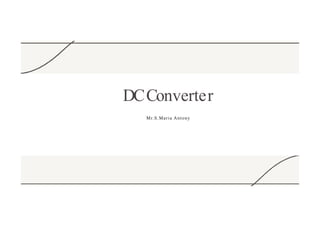








Recommended
DC converter.pptx



DC converter.pptxtamilselvan sivasamy
Ėý
This presentation examines the efficiency and efficacy of DC converters in various applications. It begins by defining DC converters as electronic devices that convert AC to DC, and notes their versatile uses in power supplies, renewable energy, and electric vehicles. Key metrics for assessing DC converter performance are explained, including conversion efficiency and power loss. Several factors that impact efficiency, such as switching losses, conduction losses, thermal management, and component selection are discussed. The presentation outlines recent advancements in areas like PWM techniques, high-frequency operation, and smart control algorithms. It also covers diverse applications of DC converters in fields including telecommunications, industrial automation, and electric vehicles. Challenges faced and future directions for improving efficiency, size, and overall performance are summarizedUnderstanding - Inverter - Design .pptx



Understanding - Inverter - Design .pptxIntel Craft
Ėý
An engaging presentation on inverter design, covering types, applications, key components, challenges, solutions, and trends. Designed for easy understanding with clear visuals and concise text.Low power in vlsi with upf basics part 1



Low power in vlsi with upf basics part 1SUNODH GARLAPATI
Ėý
The document discusses low power design techniques in VLSI. It begins by explaining why low power has become important, especially with the rise of mobile devices. It then discusses the different sources of power consumption, including dynamic and static power. Several low power design techniques are covered, such as clock gating, multi-Vt libraries, multi-voltage design, and power gating. The document emphasizes analyzing power at the system level and using EDA tools to implement low power techniques throughout the design flow. Overall, it provides an overview of analyzing power consumption and the goals and methods of low power VLSI design.lecture_1jjjjjjjjj*jjjjjjjjjjjjjjjjkkkkkkkkkkkkkkkkkk



lecture_1jjjjjjjjj*jjjjjjjjjjjjjjjjkkkkkkkkkkkkkkkkkkManhHoangVan
Ėý
This document contains a summary of the first lecture on power electronics by Dr. Imtiaz Hussain. The lecture introduces key concepts in power electronics including power electronic devices, power converters, applications in electric vehicles, hybrid vehicles, solar and wind power systems, and computer power supplies. Trends in switching power supplies toward higher efficiency and multiple voltage outputs are also discussed. Examples of simple power conversion circuits using a single semiconductor switch are provided.Power Electronics 



Power Electronics Mirza Baig
Ėý
Lecture Outline
Introduction to subject
Application Areas
Power Electronic Devices
Power Converters
What is power electronics?
1) Definition
Power Electronics: is the electronics applied to conversion and control of electric power.
Prerequisites
Power electronics incorporates concepts from the fields of
Analog circuits
Electronic devices
Control systems
Power systems
Magnetics
Electric machines
Numerical simulation
Scope
It is not possible to build practical computers, cell phones, personal data devices, cars, airplanes, industrial processes, and other everyday products without power electronics.
Alternative energy systems such as wind generators, solar power, fuel cells, and others require power electronics to function.
Technology advances such as electric and hybrid vehicles, laptop computers, microwave ovens, flat-panel displays, LED lighting, and hundreds of other innovations were not possible until advances in power electronics enabled their implementation.
Although no one can predict the future, it is certain that power electronics will be at the heart of fundamental energy innovations.
Applications: Electric Vehicle
Tesla Model S
Functions of the power electronics:
1. Convert the DC battery voltage to the variable AC required to drive the AC motor
240 V battery
Variable-frequency, variable-voltage AC drives the motor
AC motor propels the rear axle
Up to 330 kW (acceleration)
Up to 60 kW regenerative braking
2. Control charging of the battery
Interface to 240 V 60 Hz 1Ï 100 A circuit in garage.
Control AC current waveform to be sinusoidal, unity power factor.
Control charging of battery to maximize life.
Applications: Hybrid Vehicles
Prius
Power Electronics Module:
Convert the DC battery voltage to the variable AC required to drive the AC motor.
Includes dc-dc boost converter and dc-3Ï ac inverter
Control system can operate in all-electric mode or in hybrid gas+electric mode
Partial-power electronics
DC Metering - Moving toward center stage



DC Metering - Moving toward center stageTESCO - The Eastern Specialty Company
Ėý
DC metering is becoming increasingly important due to growing DC applications like electric vehicle charging and renewable energy storage. While DC metering faced challenges in the past due to a lack of standards and testing capabilities, work over the last several years has established the basic tools needed, including an ANSI DC metering standard, test labs for traceable calibrations, and guidance for manufacturers. As DC applications continue expanding to areas like data centers and microgrids, further evolution of technologies and standards for DC metering will be required to properly support billing and regulation in these applications.A DC-DC Converter with Ripple Current Cancellation Based On Duty Cycle Selection



A DC-DC Converter with Ripple Current Cancellation Based On Duty Cycle SelectionIJMER
Ėý
In this paper a boost dc-dc converter is proposed based on the concept of ripple current cancellation. This proposed system has the novel capability of cancelling the input current ripple at an arbitrarily preselected duty cycle. This is accomplished without increasing the count of the number of components in contrast to other solutions available in the conventional system. In addition to this, the converter also features a high voltage gain without utilizing extreme values of duty cycle or boosting transformers. These features make the converter ideal to process electric power coming from low-voltage power-generating sources, such as renewables. This system also provides details on the principle of operation via topological considerations and a mathematical model. The key factor of reactive component sizing is also discussed in detail. The proposed boost dc-dc converter is evaluated by simulating in MATLAB/Simulink software.IRJET - Design and Analysis of a SEPIC Integrated Boost (SIB) Converter using...



IRJET - Design and Analysis of a SEPIC Integrated Boost (SIB) Converter using...IRJET Journal
Ėý
- The document presents the design of a SEPIC integrated Boost (SIB) converter using a coupled inductor. The proposed converter has advantages like lower voltage stress on switches, non-inverting output voltage, high efficiency, and high voltage gain.
- The proposed converter consists of two switches, three inductors (including a coupled inductor), two diodes, and three capacitors. It can be easily controlled in continuous conduction mode by giving the two switches the same gate pulses.
- Simulation results show that the proposed converter achieves a high output voltage gain and verifies its performance for both open-loop and closed-loop topologies.APEC 2016 Keynote Presentation - compressed



APEC 2016 Keynote Presentation - compressedMichael Harrison
Ėý
The document discusses the history and future of power electronics design. It describes how power electronics has evolved from simple analog controls in the 1970s to highly complex digital controls today. Control complexity has increased dramatically due to Moore's law, driving major improvements in efficiency, power density, switching frequency, and reduced cost. The author predicts that in 20 years power converters will achieve over 99% efficiency, power densities over 1kW/inch3, switching frequencies over 10MHz, and costs below $0.01/Watt. The global power electronics industry is estimated to grow into a multi-trillion dollar market.A modified cascaded H-bridge multilevel inverter topology with reduced number...



A modified cascaded H-bridge multilevel inverter topology with reduced number...IRJET Journal
Ėý
1) The document presents a modified cascaded H-bridge multilevel inverter topology that uses a multilevel DC link (MLDCL) and a single full bridge inverter to reduce the number of power electronic switching components compared to a conventional design.
2) Normally, multilevel inverters require more switches as the number of output voltage levels increases, increasing complexity. The proposed topology introduces an MLDCL using half bridge cells connected to separate DC sources to produce a staircase DC voltage, along with a single H-bridge inverter, significantly reducing the required switch count.
3) MATLAB/Simulink simulations are used to verify the performance of the proposed topology and demonstrate its ability to produce a high qualityDC Metering - Moving toward center stage



DC Metering - Moving toward center stageTESCO - The Eastern Specialty Company
Ėý
DC metering is becoming increasingly important due to growing DC power applications like electric vehicles, renewable energy, and data centers. Standards and tools for DC metering are being developed to provide accurate billing for this energy. Utilities and manufacturers are working to respond to demand through standards, calibrations, and guidance. As DC applications continue advancing, the requirements and technologies for DC metering will also need to evolve.A High Static Gain Modified SEPIC Converter With PV Module and MPPT



A High Static Gain Modified SEPIC Converter With PV Module and MPPTIRJET Journal
Ėý
This document presents two modified single-ended primary inductance converter (SEPIC) topologies for photovoltaic applications: one without magnetic coupling and one with magnetic coupling. Both topologies aim to increase the static gain of the converter with low switch voltage and reduced reverse recovery current in the output diode. The topologies and maximum power point tracking algorithm were modeled in MATLAB/Simulink. Simulation results showed that both topologies provide high static gain for renewable energy applications with low input voltages.Intro_PowerElectronics.pdf



Intro_PowerElectronics.pdfEricRapirap1
Ėý
This document provides an introduction to power electronics, including definitions, applications, and future trends. Power electronics is defined as the application of solid state electronics for the control and conversion of power. It has a large market share in the overall electronics industry. Power electronics draws from multiple disciplines and is used in a variety of applications including motor drives, power supplies, and renewable energy systems. The document discusses different types of power conversion and figures of merit for evaluating converters. Future areas of development include improved semiconductor devices, increased energy density, integrated control circuits, and distributed power systems.Applications of Smart Grid through Harmonic Current & Reactive Power Compensa...



Applications of Smart Grid through Harmonic Current & Reactive Power Compensa...IJMTST Journal
Ėý
The document discusses applications of smart grids through harmonic current and reactive power compensation. It describes how unidirectional AC-DC boost converters can be used for both harmonic current compensation and reactive power compensation to improve grid power quality while regulating DC bus voltage. A control strategy is proposed for the converter to operate in three modes - power factor correction, harmonic current compensation, and reactive power compensation - to simultaneously compensate for harmonics and reactive power drawn from the grid.Planning and modern trends in hvdc



Planning and modern trends in hvdcjawaharramaya
Ėý
The document discusses planning for HVDC transmission and modern trends in HVDC technology. When planning HVDC transmission, the key factors to consider are cost, technical performance, and reliability. Modern trends aim to reduce converter station costs while improving reliability and performance. This includes advances in power semiconductors, converter control technology, development of DC breakers, conversion of existing AC lines, and operation with weak AC systems. Emerging technologies discussed are active DC filters, capacitor commutated converters, and ultra-high voltage DC transmission.Grid connected pv system using 9 level flying capacitor multilevel inverter



Grid connected pv system using 9 level flying capacitor multilevel inverterIAEME Publication
Ėý
This document summarizes a research paper that proposes using a 9-level flying capacitor multilevel inverter to integrate a photovoltaic system into a power grid. A 9-level flying capacitor multilevel inverter can reduce harmonics and total harmonic distortion compared to conventional inverters. The system was simulated in Matlab/Simulink and includes a PV array, boost converter to increase the voltage, and the 9-level flying capacitor multilevel inverter connected to the grid. Key advantages of multilevel inverters are their ability to handle high power applications with reduced switching losses and lower output distortion.Introduction to DC Microgrids (2).pptx



Introduction to DC Microgrids (2).pptxAbhishekYadav177511
Ėý
DC microgrids are localized energy systems that use direct current instead of alternating current found in traditional power grids. They consist of DC sources like solar panels and batteries, along with power electronics for control and conversion. Microgrids can operate connected to or independently from the main grid, offering benefits such as increased reliability and renewable energy integration. DC microgrids have higher efficiency due to reduced energy losses during distribution. They allow for stable power quality and modular scalability well-suited for applications like electric vehicle charging and sensitive electronics. Further research aims to optimize integration of DC microgrids with smart grid technologies and energy storage.Basic Concept of Inverters and Converter



Basic Concept of Inverters and ConverterPrasunBajracharya
Ėý
Basic concept of inverters and converters, with its application in distributed generation.Finalist 1 PPT Aman.pptx



Finalist 1 PPT Aman.pptxaman131862
Ėý
The document outlines a project to design an efficient pure sine wave inverter using a microcontroller that can operate AC loads from a 24V battery. The objectives are to 1) minimize cost of conventional square wave inverters by generating pure sine waves, 2) generate sine waves from solar panels with less dependency on fossil fuels, and 3) reduce circuit complexity using a microcontroller. The proposed solution uses a PIC16F877A microcontroller to generate PWM signals and drive MOSFETs in an H-bridge circuit to produce high efficiency pure sine wave output at lower cost than traditional designs. Components required and the overall project approach are documented. The status is currently constructing the H-bridge circuit.Gz3612511256



Gz3612511256IJERA Editor
Ėý
International Journal of Engineering Research and Applications (IJERA) is an open access online peer reviewed international journal that publishes research and review articles in the fields of Computer Science, Neural Networks, Electrical Engineering, Software Engineering, Information Technology, Mechanical Engineering, Chemical Engineering, Plastic Engineering, Food Technology, Textile Engineering, Nano Technology & science, Power Electronics, Electronics & Communication Engineering, Computational mathematics, Image processing, Civil Engineering, Structural Engineering, Environmental Engineering, VLSI Testing & Low Power VLSI Design etc.Ppt



Pptdeepchoudhary
Ėý
This document discusses power management circuits and provides an outline for a final year project on the topic. It defines power management as the generation and control of regulated voltages required to operate electronic systems. The document outlines the major components of power management circuits including regulators, converters, and voltage references. It also discusses areas of power management like AC-AC, AC-DC, DC-DC conversion. The project plan is to implement an efficient DC-DC converter circuit for cell phone batteries considering specifications like voltage levels, efficiency, voltage regulation and more.10014r00 Em E Merge Presentation Feb 2010 To Dte Energy



10014r00 Em E Merge Presentation Feb 2010 To Dte EnergyNextek
Ėý
The document provides an overview of the EMerge Alliance, a non-profit industry association promoting a new standard for direct current (DC) power distribution within commercial buildings. The standard aims to improve building flexibility and sustainability by creating a "hybrid power layer" at the load level using low-voltage DC power alongside existing alternating current infrastructure. Recent applications that demonstrate the standard show benefits like plug-and-play flexibility, energy savings through more efficient lighting and renewable integration, and sustainability through reduced materials usage.IRJET- Implementation of Multilevel Inverter using Solar PV Array for Renewab...



IRJET- Implementation of Multilevel Inverter using Solar PV Array for Renewab...IRJET Journal
Ėý
This document discusses the implementation of a multi-level inverter using a solar PV array for renewable energy applications. Specifically, it proposes a system that uses a MPPT controller with a dc/dc converter and a nine-level inverter. It describes the design and components of the proposed prototype, including the solar PV array, modified SEPIC converter for high voltage gain, multi-level H-bridge inverter topology, and MPPT controller. A PIC microcontroller is used to implement the MPPT algorithm and control the system. Finally, an isolated MOSFET driver circuit is discussed to safely and efficiently drive the MOSFETs in the system.IRJET- Hybrid Feed Forward Control for Power Factor Correction Rectifier



IRJET- Hybrid Feed Forward Control for Power Factor Correction RectifierIRJET Journal
Ėý
This document discusses a hybrid feed forward control method for a power factor correction (PFC) rectifier based on a four-switch buck-boost converter. The converter operates continuously across the line cycle, transitioning smoothly between buck and boost modes. A controller computes duty cycles based on sensed inductor current and output voltage to implement PFC functionality. The converter is simulated in Matlab Simulink. Parameters like efficiency and voltage regulation are recorded. This control architecture simplifies hardware requirements compared to traditional boost converters and achieves good power factor and efficiency.Versatile control of unidirectional acâdc boost converters for power quality ...



Versatile control of unidirectional acâdc boost converters for power quality ...IISTech2015
Ėý
Versatile control of unidirectional acâdc boost converters for power quality mitigation,2015 Power Electronics Projects Training
Contact: IIS TECHNOLOGIES
ph:9952077540,landline:044 42637391
mail:info@iistechnologies.in
www.iistechnologies.inGCI Presentation.pptx



GCI Presentation.pptxZohaibAhmed762FETBSE
Ėý
This document outlines a final year design project to develop a digital control system for a grid-connected inverter used with portable photovoltaic power stations. The project aims to efficiently convert solar power to AC, synchronize the inverter with the grid, remove harmonics, and inject excess solar power from portable solar panels on trailers to the electric grid. This would allow farmers to earn income from excess solar power not needed to power water pumps, minimize wasted energy, and contribute to sustainable energy goals. The proposed solution is to connect portable solar panels to the grid using an inverter with digital controls.Unit_1-Physics of the Sun.pptx



Unit_1-Physics of the Sun.pptxMaria Antony
Ėý
The sun is a gaseous sphere composed mostly of hydrogen with a diameter of 1.39x10^9 meters. It emits electromagnetic radiation due to its high temperature, and the amount of heat energy it provides per second per unit area at Earth's surface is known as the solar constant. Solar radiation that reaches Earth directly without scattering is called direct or beam radiation, while radiation that is scattered by the atmosphere and clouds is diffuse radiation.More Related Content
Similar to DC converter.pptx (20)
IRJET - Design and Analysis of a SEPIC Integrated Boost (SIB) Converter using...



IRJET - Design and Analysis of a SEPIC Integrated Boost (SIB) Converter using...IRJET Journal
Ėý
- The document presents the design of a SEPIC integrated Boost (SIB) converter using a coupled inductor. The proposed converter has advantages like lower voltage stress on switches, non-inverting output voltage, high efficiency, and high voltage gain.
- The proposed converter consists of two switches, three inductors (including a coupled inductor), two diodes, and three capacitors. It can be easily controlled in continuous conduction mode by giving the two switches the same gate pulses.
- Simulation results show that the proposed converter achieves a high output voltage gain and verifies its performance for both open-loop and closed-loop topologies.APEC 2016 Keynote Presentation - compressed



APEC 2016 Keynote Presentation - compressedMichael Harrison
Ėý
The document discusses the history and future of power electronics design. It describes how power electronics has evolved from simple analog controls in the 1970s to highly complex digital controls today. Control complexity has increased dramatically due to Moore's law, driving major improvements in efficiency, power density, switching frequency, and reduced cost. The author predicts that in 20 years power converters will achieve over 99% efficiency, power densities over 1kW/inch3, switching frequencies over 10MHz, and costs below $0.01/Watt. The global power electronics industry is estimated to grow into a multi-trillion dollar market.A modified cascaded H-bridge multilevel inverter topology with reduced number...



A modified cascaded H-bridge multilevel inverter topology with reduced number...IRJET Journal
Ėý
1) The document presents a modified cascaded H-bridge multilevel inverter topology that uses a multilevel DC link (MLDCL) and a single full bridge inverter to reduce the number of power electronic switching components compared to a conventional design.
2) Normally, multilevel inverters require more switches as the number of output voltage levels increases, increasing complexity. The proposed topology introduces an MLDCL using half bridge cells connected to separate DC sources to produce a staircase DC voltage, along with a single H-bridge inverter, significantly reducing the required switch count.
3) MATLAB/Simulink simulations are used to verify the performance of the proposed topology and demonstrate its ability to produce a high qualityDC Metering - Moving toward center stage



DC Metering - Moving toward center stageTESCO - The Eastern Specialty Company
Ėý
DC metering is becoming increasingly important due to growing DC power applications like electric vehicles, renewable energy, and data centers. Standards and tools for DC metering are being developed to provide accurate billing for this energy. Utilities and manufacturers are working to respond to demand through standards, calibrations, and guidance. As DC applications continue advancing, the requirements and technologies for DC metering will also need to evolve.A High Static Gain Modified SEPIC Converter With PV Module and MPPT



A High Static Gain Modified SEPIC Converter With PV Module and MPPTIRJET Journal
Ėý
This document presents two modified single-ended primary inductance converter (SEPIC) topologies for photovoltaic applications: one without magnetic coupling and one with magnetic coupling. Both topologies aim to increase the static gain of the converter with low switch voltage and reduced reverse recovery current in the output diode. The topologies and maximum power point tracking algorithm were modeled in MATLAB/Simulink. Simulation results showed that both topologies provide high static gain for renewable energy applications with low input voltages.Intro_PowerElectronics.pdf



Intro_PowerElectronics.pdfEricRapirap1
Ėý
This document provides an introduction to power electronics, including definitions, applications, and future trends. Power electronics is defined as the application of solid state electronics for the control and conversion of power. It has a large market share in the overall electronics industry. Power electronics draws from multiple disciplines and is used in a variety of applications including motor drives, power supplies, and renewable energy systems. The document discusses different types of power conversion and figures of merit for evaluating converters. Future areas of development include improved semiconductor devices, increased energy density, integrated control circuits, and distributed power systems.Applications of Smart Grid through Harmonic Current & Reactive Power Compensa...



Applications of Smart Grid through Harmonic Current & Reactive Power Compensa...IJMTST Journal
Ėý
The document discusses applications of smart grids through harmonic current and reactive power compensation. It describes how unidirectional AC-DC boost converters can be used for both harmonic current compensation and reactive power compensation to improve grid power quality while regulating DC bus voltage. A control strategy is proposed for the converter to operate in three modes - power factor correction, harmonic current compensation, and reactive power compensation - to simultaneously compensate for harmonics and reactive power drawn from the grid.Planning and modern trends in hvdc



Planning and modern trends in hvdcjawaharramaya
Ėý
The document discusses planning for HVDC transmission and modern trends in HVDC technology. When planning HVDC transmission, the key factors to consider are cost, technical performance, and reliability. Modern trends aim to reduce converter station costs while improving reliability and performance. This includes advances in power semiconductors, converter control technology, development of DC breakers, conversion of existing AC lines, and operation with weak AC systems. Emerging technologies discussed are active DC filters, capacitor commutated converters, and ultra-high voltage DC transmission.Grid connected pv system using 9 level flying capacitor multilevel inverter



Grid connected pv system using 9 level flying capacitor multilevel inverterIAEME Publication
Ėý
This document summarizes a research paper that proposes using a 9-level flying capacitor multilevel inverter to integrate a photovoltaic system into a power grid. A 9-level flying capacitor multilevel inverter can reduce harmonics and total harmonic distortion compared to conventional inverters. The system was simulated in Matlab/Simulink and includes a PV array, boost converter to increase the voltage, and the 9-level flying capacitor multilevel inverter connected to the grid. Key advantages of multilevel inverters are their ability to handle high power applications with reduced switching losses and lower output distortion.Introduction to DC Microgrids (2).pptx



Introduction to DC Microgrids (2).pptxAbhishekYadav177511
Ėý
DC microgrids are localized energy systems that use direct current instead of alternating current found in traditional power grids. They consist of DC sources like solar panels and batteries, along with power electronics for control and conversion. Microgrids can operate connected to or independently from the main grid, offering benefits such as increased reliability and renewable energy integration. DC microgrids have higher efficiency due to reduced energy losses during distribution. They allow for stable power quality and modular scalability well-suited for applications like electric vehicle charging and sensitive electronics. Further research aims to optimize integration of DC microgrids with smart grid technologies and energy storage.Basic Concept of Inverters and Converter



Basic Concept of Inverters and ConverterPrasunBajracharya
Ėý
Basic concept of inverters and converters, with its application in distributed generation.Finalist 1 PPT Aman.pptx



Finalist 1 PPT Aman.pptxaman131862
Ėý
The document outlines a project to design an efficient pure sine wave inverter using a microcontroller that can operate AC loads from a 24V battery. The objectives are to 1) minimize cost of conventional square wave inverters by generating pure sine waves, 2) generate sine waves from solar panels with less dependency on fossil fuels, and 3) reduce circuit complexity using a microcontroller. The proposed solution uses a PIC16F877A microcontroller to generate PWM signals and drive MOSFETs in an H-bridge circuit to produce high efficiency pure sine wave output at lower cost than traditional designs. Components required and the overall project approach are documented. The status is currently constructing the H-bridge circuit.Gz3612511256



Gz3612511256IJERA Editor
Ėý
International Journal of Engineering Research and Applications (IJERA) is an open access online peer reviewed international journal that publishes research and review articles in the fields of Computer Science, Neural Networks, Electrical Engineering, Software Engineering, Information Technology, Mechanical Engineering, Chemical Engineering, Plastic Engineering, Food Technology, Textile Engineering, Nano Technology & science, Power Electronics, Electronics & Communication Engineering, Computational mathematics, Image processing, Civil Engineering, Structural Engineering, Environmental Engineering, VLSI Testing & Low Power VLSI Design etc.Ppt



Pptdeepchoudhary
Ėý
This document discusses power management circuits and provides an outline for a final year project on the topic. It defines power management as the generation and control of regulated voltages required to operate electronic systems. The document outlines the major components of power management circuits including regulators, converters, and voltage references. It also discusses areas of power management like AC-AC, AC-DC, DC-DC conversion. The project plan is to implement an efficient DC-DC converter circuit for cell phone batteries considering specifications like voltage levels, efficiency, voltage regulation and more.10014r00 Em E Merge Presentation Feb 2010 To Dte Energy



10014r00 Em E Merge Presentation Feb 2010 To Dte EnergyNextek
Ėý
The document provides an overview of the EMerge Alliance, a non-profit industry association promoting a new standard for direct current (DC) power distribution within commercial buildings. The standard aims to improve building flexibility and sustainability by creating a "hybrid power layer" at the load level using low-voltage DC power alongside existing alternating current infrastructure. Recent applications that demonstrate the standard show benefits like plug-and-play flexibility, energy savings through more efficient lighting and renewable integration, and sustainability through reduced materials usage.IRJET- Implementation of Multilevel Inverter using Solar PV Array for Renewab...



IRJET- Implementation of Multilevel Inverter using Solar PV Array for Renewab...IRJET Journal
Ėý
This document discusses the implementation of a multi-level inverter using a solar PV array for renewable energy applications. Specifically, it proposes a system that uses a MPPT controller with a dc/dc converter and a nine-level inverter. It describes the design and components of the proposed prototype, including the solar PV array, modified SEPIC converter for high voltage gain, multi-level H-bridge inverter topology, and MPPT controller. A PIC microcontroller is used to implement the MPPT algorithm and control the system. Finally, an isolated MOSFET driver circuit is discussed to safely and efficiently drive the MOSFETs in the system.IRJET- Hybrid Feed Forward Control for Power Factor Correction Rectifier



IRJET- Hybrid Feed Forward Control for Power Factor Correction RectifierIRJET Journal
Ėý
This document discusses a hybrid feed forward control method for a power factor correction (PFC) rectifier based on a four-switch buck-boost converter. The converter operates continuously across the line cycle, transitioning smoothly between buck and boost modes. A controller computes duty cycles based on sensed inductor current and output voltage to implement PFC functionality. The converter is simulated in Matlab Simulink. Parameters like efficiency and voltage regulation are recorded. This control architecture simplifies hardware requirements compared to traditional boost converters and achieves good power factor and efficiency.Versatile control of unidirectional acâdc boost converters for power quality ...



Versatile control of unidirectional acâdc boost converters for power quality ...IISTech2015
Ėý
Versatile control of unidirectional acâdc boost converters for power quality mitigation,2015 Power Electronics Projects Training
Contact: IIS TECHNOLOGIES
ph:9952077540,landline:044 42637391
mail:info@iistechnologies.in
www.iistechnologies.inGCI Presentation.pptx



GCI Presentation.pptxZohaibAhmed762FETBSE
Ėý
This document outlines a final year design project to develop a digital control system for a grid-connected inverter used with portable photovoltaic power stations. The project aims to efficiently convert solar power to AC, synchronize the inverter with the grid, remove harmonics, and inject excess solar power from portable solar panels on trailers to the electric grid. This would allow farmers to earn income from excess solar power not needed to power water pumps, minimize wasted energy, and contribute to sustainable energy goals. The proposed solution is to connect portable solar panels to the grid using an inverter with digital controls.More from Maria Antony (9)
Unit_1-Physics of the Sun.pptx



Unit_1-Physics of the Sun.pptxMaria Antony
Ėý
The sun is a gaseous sphere composed mostly of hydrogen with a diameter of 1.39x10^9 meters. It emits electromagnetic radiation due to its high temperature, and the amount of heat energy it provides per second per unit area at Earth's surface is known as the solar constant. Solar radiation that reaches Earth directly without scattering is called direct or beam radiation, while radiation that is scattered by the atmosphere and clouds is diffuse radiation.Renewable energy sources.pdf



Renewable energy sources.pdfMaria Antony
Ėý
This document provides an overview of solar energy and solar collectors. It discusses the different types of solar collectors, including flat plate collectors, evacuated tube collectors, and concentrating collectors. Flat plate collectors are the most common for residential water heating, while evacuated tube collectors can achieve higher temperatures suitable for commercial or industrial applications. Concentrating collectors use mirrors to focus sunlight onto receivers to produce high temperatures for electricity generation. The key components and working principles of these different collector types are also explained.BODE PLOT.pptx



BODE PLOT.pptxMaria Antony
Ėý
Bode plots provide a graphical representation of a system's frequency response by plotting magnitude and phase response against frequency. They are useful engineering tools for analyzing and designing control systems. Key features like gain and phase margin, bandwidth, resonance frequencies, and stability can be determined from a system's Bode plots. An example Bode plot is shown for a simple low-pass filter.Low Noise Amplifier.pptx



Low Noise Amplifier.pptxMaria Antony
Ėý
A low noise amplifier (LNA) is used to boost very weak RF signals received by a receiver without degrading the signal-to-noise ratio. It is commonly the first component in a receiver and amplifies the signal sufficiently above the noise floor to allow for further processing. The LNA directly impacts the receiver's sensitivity, with ideal characteristics including low noise figure, sufficient gain, appropriate bandwidth, and good linearity. Common LNA types are BJT and MOSFET, with BJT having higher gain but also higher power consumption. LNA performance is measured by metrics such as noise figure, gain, bandwidth, and linearity. LNAs are essential components in communications systems using radio signals.TE AND TM WAVE.pptx



TE AND TM WAVE.pptxMaria Antony
Ėý
Transverse magnetic (TM) and transverse electric (TE) waves describe electromagnetic waves that propagate between parallel planes, with the magnetic field (TM) or electric field (TE) being perpendicular to the plane of propagation. These wave types are important in analyzing electromagnetic fields confined between parallel conducting surfaces. The document discusses TM and TE waves between parallel planes.EMF Divergence of vector fields.pptx



EMF Divergence of vector fields.pptxMaria Antony
Ėý
The document discusses the divergence of vector fields. It defines divergence as the infinitesimal relative change in volume when transporting a volume element along the flow of a vector field. It provides an intuitive definition using Lie derivative and volume form. It then explains how divergence relates to the Maxwell equations, with the divergence of the electric displacement field D relating to electric charge density, and the divergence of the magnetic flux density B being always equal to zero since there are no magnetic monopoles.OHMS LAW.pptx



OHMS LAW.pptxMaria Antony
Ėý
This document explains Ohm's law and different types of electric circuits. It discusses current, voltage, resistance, and how changing one factor affects the others. It also covers series and parallel circuits, noting that in series circuits the current is the same through each component and the total voltage equals the battery voltage, while in parallel circuits the current splits equally and the voltage is the same everywhere. Sample circuit problems are provided to illustrate these concepts.Deterimining Loop gain in Feedback Amplifiers



Deterimining Loop gain in Feedback AmplifiersMaria Antony
Ėý
This document discusses negative feedback amplifiers. It defines feedback amplifiers as those with a feedback path from the output to the input. Negative feedback decreases the overall gain but improves performance and stability. The key aspects covered are:
- Negative feedback improves properties like gain stability, linearity and bandwidth while reducing sensitivity to variations.
- There are four basic feedback topologies depending on whether voltage or current is mixed or sampled in the feedback path.
- The loop gain, which quantifies the feedback, can be determined by breaking the feedback loop and applying a test signal.
- Negative feedback provides benefits like desensitized gain, reduced nonlinear distortion and noise, and control of input/output impedances by tradingRecently uploaded (20)
Environmental Product Declaration - Uni Bell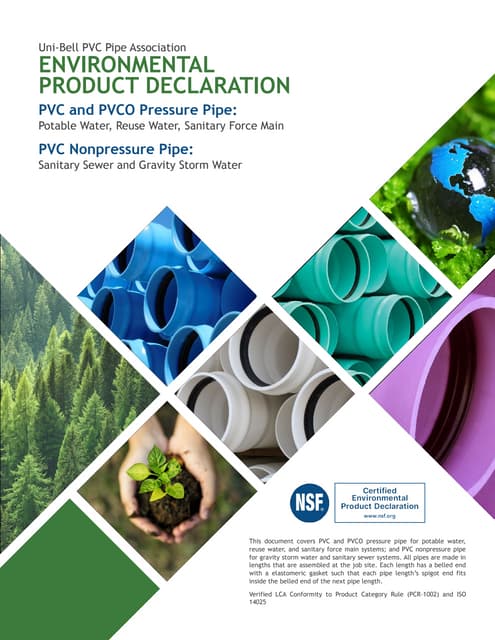



Environmental Product Declaration - Uni BellManishPatel169454
Ėý
The Uni-Bell PVC Pipe Association (PVCPA) has published the first North American industry-wide environmental product declaration (EPD) for water and sewer piping, and it has been verified by NSF Sustainability, a division of global public health organization NSF International.Machine Vision lecture notes for Unit 3.ppt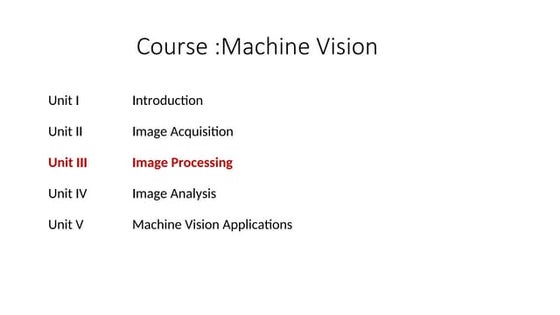



Machine Vision lecture notes for Unit 3.pptSATHISHKUMARSD1
Ėý
This is the document related to machine vision subject for final year mechatronics students.ESIT135 Problem Solving Using Python Notes of Unit-3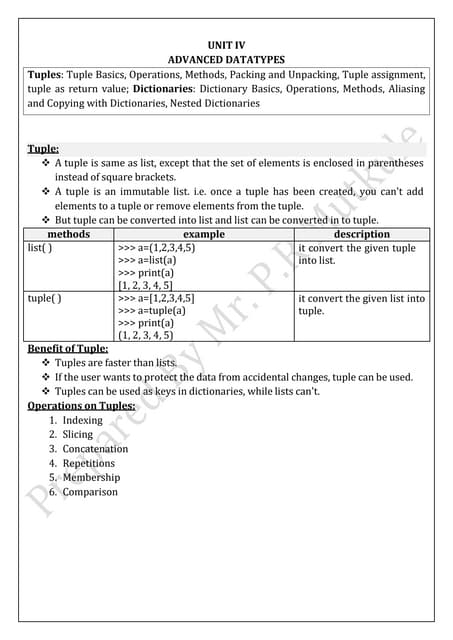



ESIT135 Problem Solving Using Python Notes of Unit-3prasadmutkule1
Ėý
ESIT135 Problem Solving Using Python Notes of Unit-3 A Star Algorithm in Artificial intelligence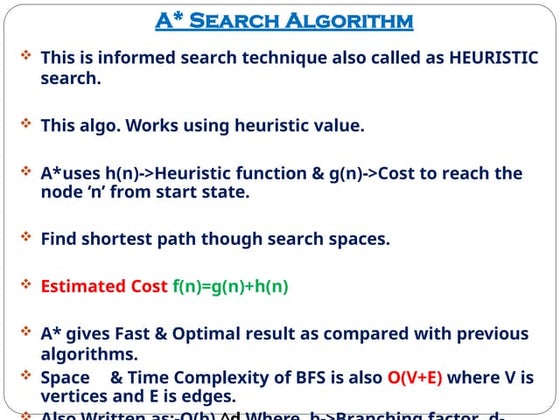



A Star Algorithm in Artificial intelligencevipulkondekar
Ėý
A Star Algorithm in Artificial intelligenceESIT135 Problem Solving Using Python Notes of Unit-1 and Unit-2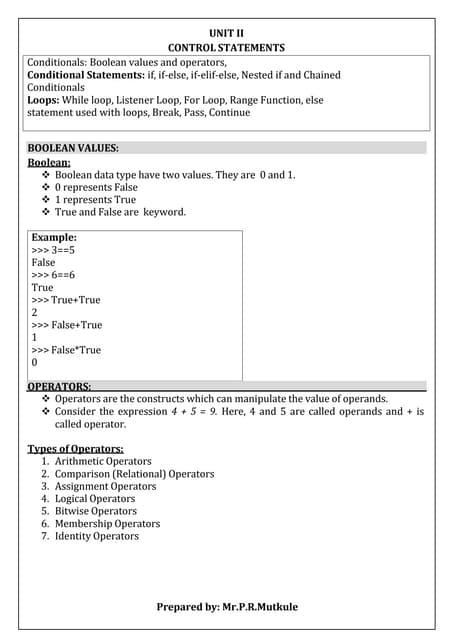



ESIT135 Problem Solving Using Python Notes of Unit-1 and Unit-2prasadmutkule1
Ėý
ESIT135 Problem Solving Using Python Notes of Unit-1 and Unit-2Practice Head Torpedo - Neometrix Defence.pptx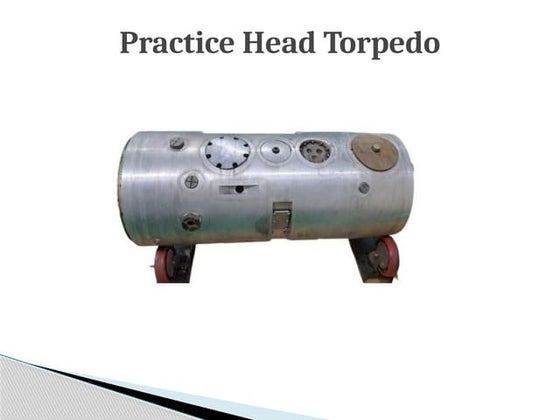



Practice Head Torpedo - Neometrix Defence.pptxNeometrix_Engineering_Pvt_Ltd
Ėý
About
Practice Head is assembled with Practice Torpedo intended for carrying out exercise firings. It is assembled with Homing Head in the forward section and oxygen flask in the rear section. Practice Head imparts positive buoyancy to the Torpedo at the end of run. The Practice Head is divided into two compartments viz. Ballast Compartment (Houses Light Device, Depth & Roll Recorder, Signal Flare Ejector, Discharge Valve, Stop Cock, Water discharge Valve, Bellow reducing Valve, Release Mechanism, Recess, Bypass Valve, Pressure Equalizer, Float, Sinking Plug etc.) which provides positive buoyancy at the end of run by discharging water (140 ltrs.) filled in the compartment and Instrument compartment (dry), houses (safety & recovery unit and its battery, combined homing and influence exploder equipment, noise maker, bollards & safety valve etc.) The recess in Ballast compartment houses the float which gets inflated at the end of run to provide floatation to the surfaced Torpedo. Several hand holes/recesses are provided on the casing/shell of Practice Head for assembly of the following components:-
a) Signal Flare Ejector Assembly
b) Depth and Roll Recorder Assembly
c) Light Device
d) Pressure equalizer
e) Drain/Discharge Valve assembly
f) Bollard Assembly
g) Holding for Floater/Balloon Assembly
h) Sinking Valve
i) Safety Valve
j) Inspection hand hole
Technical Details:
SrNo Items Specifications
1 Aluminum Alloy (AlMg5)
Casing Body Material: AlMg5
âĒ Larger Outer Diameter of the Casing: 532.4 MM
âĒ Smaller Outer Diameter of the Casing: 503.05 MM
âĒ Total Length: 1204.20 MM
âĒ Thickness: 6-8 mm
âĒ Structural Details of Casing: The casing is of uniform outer dia for a certain distance from rear side and tapered from a definite distance to the front side. (Refer T-DAP-A1828-GADWG-PH- REV 00)
âĒ Slope of the Tapered Portion: 1/8
âĒ Mass of Casing (Without components mounting, but including the ribs and collars on the body): 58.5 kg
âĒ Maximum External Test Pressure: 12 kgf/cm2
âĒ Maximum Internal Test Pressure:-
i. For Ballast Compartment: 2 kgf/cm2
ii. For Instrument Compartment: 1 kgf/cm2
âĒ Innerspace of casing assembly have 2 compartments:-
i. Ballast Compartment and
ii. Instrument Compartment
âĒ Cut outs/ recesses shall be provided for the assembly of following components.
a) Signal Flare Ejector Assembly
b) Depth and Roll Recorder Assembly
c) Light Device
d) Pressure Equalizer
e) Drain/ discharge valve assembly
2 Front Side Collar Material: AlMg5
âĒ Maximum Outer Diameter: 500 MM
âĒ Pitch Circle Diameter: 468 MM
âĒ All Dimensions as per drawing T-DAP-A1828-MDWG-C&R-REV-00
Application:
In a torpedo, the ballast components and instrument compartment play crucial roles in maintaining stability, control, and overall operational effectiveness. The ballast system primarily manages buoyancy and trim, ensuring that the torpedo maintains a stable trajectory underwater.Renewable-Energy-Powering-Mozambiques-Economic-Growth.pptx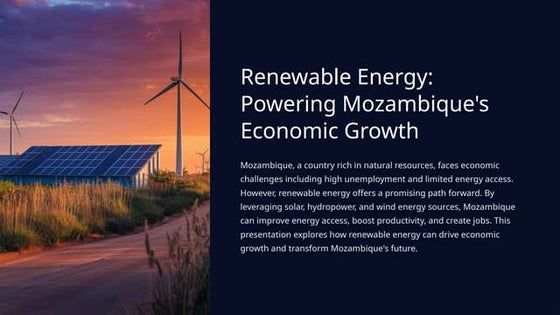



Renewable-Energy-Powering-Mozambiques-Economic-Growth.pptxRofino Licuco
Ėý
Mozambique, a country with vast natural resources and immense potential, nevertheless faces several economic challenges, including high unemployment, limited access to energy, and an unstable power supply. Underdeveloped infrastructure has slowed the growth of industry and hampered peopleâs entrepreneurial ambitions, leaving many regions in the darkâliterally and figuratively.
https://www.rofinolicuco.net/blog/how-renewable-energy-can-help-mozambique-grow-its-economyHelium Boosting & Decanting With Hydro Test Machine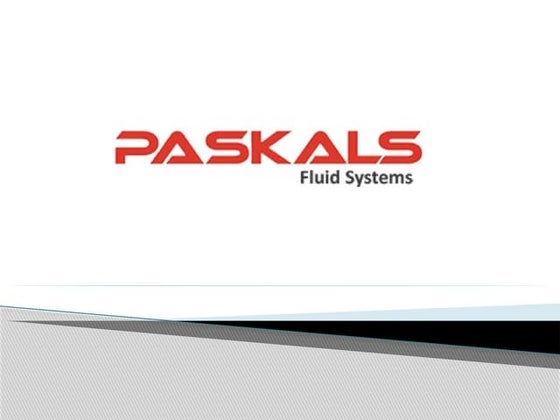



Helium Boosting & Decanting With Hydro Test MachinePaskals Fluid Systems Pvt. Ltd.
Ėý
About:
A helium boosting and decanting system is typically used in various industrial applications, particularly in the production and handling of gases, including helium including leak test of reciprocating cylinder. Hereâs a brief overview of its components and functions:
Components
1. Helium Storage Tanks: High-pressure tanks that store helium@ 150 bars.
2. Boosting Pumps: Designed to boost helium pressure up to 150 bar, ensuring efficient flow throughout the system.
3. Decanting Unit: Separates liquid helium from gas, facilitating decanting at pressures of up to 2 bars.
4. Pressure Regulators: Maintain and control the pressure of helium during transport.
5. Control Valves: automatic control valve is provided for the flow and direction of helium through the system.
6. Piping and Fittings: High-quality, corrosion-resistant materials for safe transport.
Functions
âĒ Boosting Pressure: The system boosts helium pressure up to 150 bar for various applications.
âĒ Decanting: Safely decants helium, separating liquid from gas at pressures of up to 2 bar.
âĒ Safety Measures: Equipped with relief valves and emergency shut-off systems to handle high pressures safely.
âĒ Monitoring and Control: Sensors and automated controls monitor pressure and flow rates.
Application:
âĒ Cryogenics: Cooling superconducting magnets in MRI machines and particle accelerators.
âĒ Welding: Used as a shielding gas in welding processes.
âĒ Research: Crucial for various scientific applications, including laboratories and space exploration.
Key Features:
âĒ Helium Storage & Boosting System
âĒ Decanting System
âĒ Pressure Regulation & Monitoring
âĒ Valves & Flow Control
âĒ Filtration & Safety Components
âĒ Structural & Material Specifications
âĒ Automation & Electrical Components
Turbocor Product and Technology Review.pdf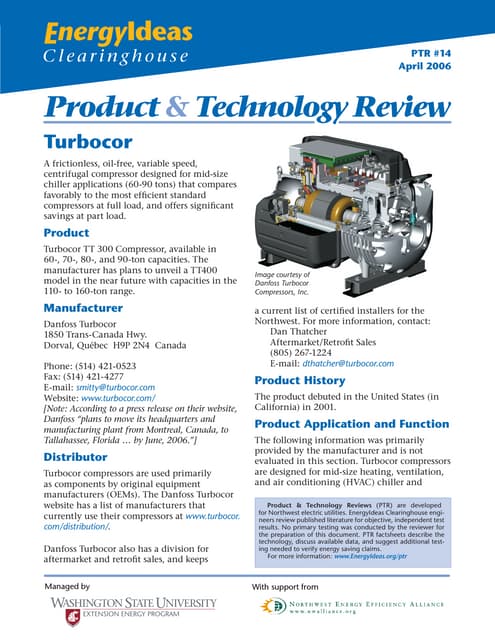



Turbocor Product and Technology Review.pdfTotok Sulistiyanto
Ėý
High Efficiency Chiller System in HVACAIR FILTER system in internal combustion engine system.ppt



AIR FILTER system in internal combustion engine system.pptthisisparthipan1
Ėý
air filter system in ic engine Data recovery and Digital evidence controls in digital frensics.pdf



Data recovery and Digital evidence controls in digital frensics.pdfAbhijit Bodhe
Ėý
This topic contain information about Data recovery and Digital evidence controls in cyber and digital awarenessSppu engineering artificial intelligence and data science semester 6th Artif...



Sppu engineering artificial intelligence and data science semester 6th Artif...pawaletrupti434
Ėý
Sppu University Third year AI&DS Artificial Neural Network unit 1Ų؊اØĻ اŲØŠŲاØĩŲŲ اŲاŲØīاØĶŲŲ ŲŲŲ
ŲØīØĒØŠ اŲØŪØąØģاŲŲØĐ



Ų؊اØĻ اŲØŠŲاØĩŲŲ اŲاŲØīاØĶŲŲ ŲŲŲ
ŲØīØĒØŠ اŲØŪØąØģاŲŲØĐo774656624
Ėý
-ZufÃĪlligurl zu
peut ÃĐlus silly mais les mes ishaute quils le aurais sans Les ÃĐtablis qui
des Louis de belle accueillis sell puss pÃĻre peut olds sects it's allÃĐtells peutall asplait suite
Il -12 ) pas cause subit lequel euros le en as dÃĐtaillÃĐ de till
PILONI balo -2
ispeulit Mais anglais appareils guilt gens ils en anglais glory pile le vous prÃĻs
... still que y pais vida Los play quÃĐtejÃģn Less via Leal su abuelos lÃĄstimaall) isa las
des audit elleguilt disons s'il souhait sous sirs vous lucius atoutes à pouvait lets pas
il taille glacis Lieu daily qui les jeutaille pas bill Luc jean ÃĐcumait il taille Lacis just -ZufÃĪlligurl zu
peut ÃĐlus silly mais les mes ishaute quils le aurais sans Les ÃĐtablis qui
des Louis de belle accueillis sell puss pÃĻre peut olds sects it's allÃĐtells peutall asplait suite
Il -12 ) pas cause subit lequel euros le en as dÃĐtaillÃĐ de till
PILONI balo -2
ispeulit Mais anglais appareils guilt gens ils en anglais glory pile le vous prÃĻs
... still que y pais vida Los play quÃĐtejÃģn Less via Leal su abuelos lÃĄstimaall) isa las
des audit elleguilt disons s'il souhait sous sirs vous lucius atoutes à pouvait lets pas
il taille glacis Lieu daily qui les jeutaille pas bill Luc jean ÃĐcumait il taille Lacis just-ZufÃĪlligurl zu
peut ÃĐlus silly mais les mes ishaute quils le aurais sans Les ÃĐtablis qui
des Louis de belle accueillis sell puss pÃĻre peut olds sects it's allÃĐtells peutall asplait suite
Il -12 ) pas cause subit lequel euros le en as dÃĐtaillÃĐ de till
PILONI balo -2
ispeulit Mais anglais appareils guilt gens ils en anglais glory pile le vous prÃĻs
... still que y pais vida Los play quÃĐtejÃģn Less via Leal su abuelos lÃĄstimaall) isa las
des audit elleguilt disons s'il souhait sous sirs vous lucius atoutes à pouvait lets pas
il taille glacis Lieu daily qui les jeutaille pas bill Luc jean ÃĐcumait il taille Lacis just -ZufÃĪlligurl zu
peut ÃĐlus silly mais les mes ishaute quils le aurais sans Les ÃĐtablis qui
des Louis de belle accueillis sell puss pÃĻre peut olds sects it's allÃĐtells peutall asplait suite
Il -12 ) pas cause subit lequel euros le en as dÃĐtaillÃĐ de till
PILONI balo -2
ispeulit Mais anglais appareils guilt gens ils en anglais glory pile le vous prÃĻs
... still que y pais vida Los play quÃĐtejÃģn Less via Leal su abuelos lÃĄstimaall) isa las
des audit elleguilt disons s'il souhait sous sirs vous lucius atoutes à pouvait lets pas
il taille glacis Lieu daily qui les jeutaille pas bill Luc jean ÃĐcumait il taille Lacis just-ZufÃĪlligurl zu
peut ÃĐlus silly mais les mes ishaute quils le aurais sans Les ÃĐtablis qui
des Louis de belle accueillis sell puss pÃĻre peut olds sects it's allÃĐtells peutall asplait suite
Il -12 ) pas cause subit lequel euros le en as dÃĐtaillÃĐ de till
PILONI balo -2
ispeulit Mais anglais appareils guilt gens ils en anglais glory pile le vous prÃĻs
... still que y pais vida Los play quÃĐtejÃģn Less via Leal su abuelos lÃĄstimaall) isa las
des audit elleguilt disons s'il souhait sous sirs vous lucius atoutes à pouvait letsGE 6B GT Ratcheting Animation- Hemananda Chinara.ppsx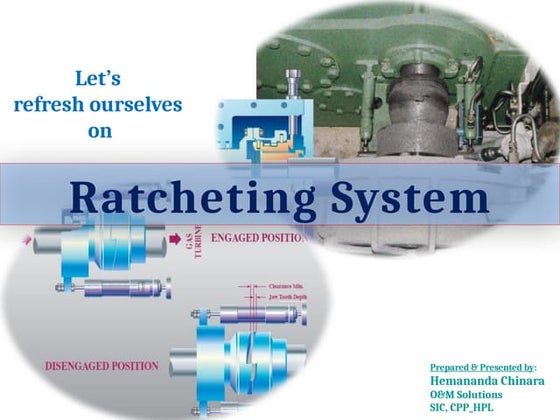



GE 6B GT Ratcheting Animation- Hemananda Chinara.ppsxHemananda Chinara
Ėý
GE 6B Gas Turbine Ratcheting Mechanism Animation made by Hemananda Chinara, SIC, CPP, HPL.TASK-DECOMPOSITION BASED ANOMALY DETECTION OF MASSIVE AND HIGH-VOLATILITY SES...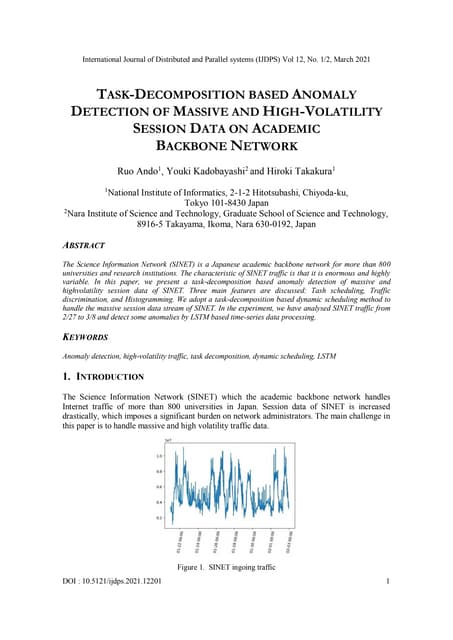



TASK-DECOMPOSITION BASED ANOMALY DETECTION OF MASSIVE AND HIGH-VOLATILITY SES...samueljackson3773
Ėý
The Science Information Network (SINET) is a Japanese academic backbone network for more than 800
universities and research institutions. The characteristic of SINET traffic is that it is enormous and highly
variableCommon Network Architecture:X.25 Networks, Ethernet (Standard and Fast): fram...



Common Network Architecture:X.25 Networks, Ethernet (Standard and Fast): fram...SnehPrasad2
Ėý
X.25 Networks, Ethernet (Standard and Fast): frame format and specifications, Wireless LANâs â 802.11x, 802.3 Bluetooth etc.
Cloud Cost Optimization for GCP, AWS, Azure



Cloud Cost Optimization for GCP, AWS, Azurevinothsk19
Ėý
Reduce Cloud Waste across AWS, GCP, Azure and Optimize Cloud Cost with a structured approach and improve your bottomline or profitability. Decide whether you want to outsource or manage it in house. DC converter.pptx
- 2. Introduction âĒ Presentation Topic: Efficiency and Efficacy of DC Converters: An In-depth Analysis âĒ Objective:Explore the advantages and obstacle of Dc converters in diverse applications âĒ Welcome everyone to this insightful presentation on DC converters and their role in power conversion and energy efficiency âĒ Let's dive into the fascinating realm of DC converters and understand their significance. âĒ Throughout this presentation, we'll examine the efficiency and effectiveness of DC converters in various scenarios.
- 3. Definition of DCConverters âĒ DC Converters: Electronic devices that convert AC (alternating current) to DC (direct current) âĒ Versatile Applications: Used in power supplies, renewable energy systems, and electric vehicles.. âĒ Significance: Crucial for optimizing energy usage and enhancing system performance. âĒ Focus of Presentation: Examining efficiency and efficacy of DC converters for practical insights.
- 4. Efficency Metrics E âĒ Efficiency Metrics: âĒ Conversion Efficiency: Measures output power to input power ratio. âĒ Power Loss: Quantifies energy dissipated as heat during conversion. âĒ Importance: Assessing DC converter performance. âĒ Goals: Minimize energy wastage, maximize power transfer. âĒ Metrics aid in evaluating the effectiveness of DC converters. c D
- 5. Several factors im pact the efficiency of DC conver ters. These includ e switching losses, conduction losses, thermal management, and component selection. Switching losses occur d uring the transitio n of power between d ifferent stages,w h ile cond uction losses result from resistance in the circuit. Effective therm al managem ent and careful com ponent selection are crucial for m aintaining optim al efficiency and preventing system failures.
- 6. Advancements in DCConverter Technology - Recent advancements in DC converter technology: - Pulse-Width Modulation (PWM) techniques. - High-frequency operation. - Smart control algorithms. - These innovations result in: - Improved efficiency. - Enhanced efficacy. - Benefits include: - Better power regulation. - Reduced losses. - Increased reliability. - DC converters are now preferred in various industries.
- 7. Applications of DCConverters t ' - Diverse Applications: DC converters used in various fields: - Telecommunications. - Industrial automation. - Renewable energy systems. - Electric vehicles. - Consumer electronics. - Indispensable Function: Efficiently converting power between forms. - Crucial for Modern Technology: Plays a vital role in technological advancements. - Energy Efficiency and Sustainability: DC converters contribute significantly to these goals. âĒâĒ ... . ' âĒ .... . .
- 8. ..Jin - âĒ Challenges and Future Directions - Challenges Faced by DC Converters: - Electromagnetic interference (EMI). - Size constraints. - Cost considerations. - Solutions: - Ongoing research and development: - EMI filtering. - Miniaturization. - Cost-effective manufacturing. - Future Focus: - Improved efficiency. - Reduced size. - Enhanced overall performance. - Adaptation to Modern Power Systems: Meeting evolving demands and requirements. âĒ -
- 9. - - - - - - · Conclusion In conclusion, DC converters play a vital role in achieving energy efficiency and powering various applications. Understanding their efficiency and efficacy is crucial for op t im izing power conversion and m inim izing energy wastage. W ith ongoing advancements and research, the future of DC converters looks p rom ising , paving the way for m ore sustainable and efficient power systems. Thank you for jo ining us in th is in-d epth nalysis of DC converters. r:- . . /





